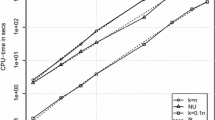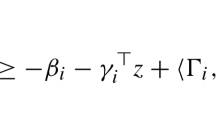Abstract
The multi-objective unconstrained combinatorial optimization problem (MUCO) can be considered as an archetype of a discrete linear multi-objective optimization problem. It can be interpreted as a specific relaxation of any multi-objective combinatorial optimization problem with linear sum objective function. While its single criteria analogon is analytically solvable, MUCO shares the computational complexity issues of most multi-objective combinatorial optimization problems: intractability and NP-hardness of the \(\varepsilon \)-constraint scalarizations. In this article interrelations between the supported points of a MUCO problem, arrangements of hyperplanes and a weight space decomposition, and zonotopes are presented. Based on these interrelations and a result by Zaslavsky on the number of faces in an arrangement of hyperplanes, a polynomial bound on the number of extreme supported solutions can be derived, leading to an exact polynomial time algorithm to find all extreme supported solutions. It is shown how this algorithm can be incorporated into a solution approach for multi-objective knapsack problems.











Similar content being viewed by others
References
Aissi, H., Mahjoub, A.R., McCormick, S.T., Queyranne, M.: Strongly polynomial bounds for multiobjective and parametric global minimum cuts in graphs and hypergraphs. Math. Program. 154(1), 3–28 (2015)
Aneja, Y.P., Nair, K.P.K.: Bicriteria transportation problem. Manag. Sci. 25(1), 73–78 (1979)
Benson, H.P., Sun, E.: Outcome space partition of the weight set in multiobjective linear programming. J. Optim. Theory Appl. 105(1), 17–36 (2000)
Benson, H.P., Sun, E.: A weight set decomposition algorithm for finding all efficient extreme points in the outcome set of a multiple objective linear program. Eur. J. Oper. Res. 139, 26–41 (2002)
Bentley, J.L., Ottmann, T.A.: Algorithms for reporting and counting geometric intersections. IEEE Trans. Comput. C–28(9), 643–647 (1979)
Bökler, F., Mutzel, P.: Output-sensitive algorithms for enumerating the extreme nondominated points of multiobjective combinatorial optimization problems. In: Bansal, N., Finocchi, I. (eds.) Algorithms–ESA 2015: 23rd Annual European Symposium, Patras, Greece, September 14–16, 2015, Proceedings, pp. 288–299. Springer, Berlin (2015)
Bökler, F., Ehrgott, M., Morris, C., Mutzel, P.: Output-sensitive complexity of multiobjective combinatorial optimization. J. Multicrit. Decis. Anal. 24(1–2), 25–36 (2017)
Buck, R.: Partition of space. Am. Math. Mon. 50(9), 541–544 (1943)
Edelsbrunner, H.: Algorithms in Combinatorial Geometry. Springer, Berlin (1987)
Ehrgott, M.: Multicriteria Optimization. Springer, Berlin (2005)
Ehrgott, M., Gandibleux, X.: A survey and annotated bibliography of multiobjective combinatorial optimization. OR Spektrum 22, 425–460 (2000)
Ehrgott, M., Löhne, A., Shao, L.: A dual variant of Benson’s “outer approximation algorithm” for multiple objective linear programming. J. Global Optim. 52, 757–778 (2012)
Ferrez, J.A., Fukuda, K., Liebling, T.M.: Solving the fixed rank convex quadratic maximization in binary variables by a parallel zonotope construction algorithm. Eur. J. Oper. Res. 166, 35–50 (2005)
Figueira, J.R., Fonseca, C.M., Halffmann, P., Klamroth, K., Paquete, L., Ruzika, S., Schulze, B., Stiglmayr, M., Willems, D.: Easy to say they are hard, but hard to see they are easy: towards a categorization of tractable multiobjective combinatorial optimization problems. J. Multi-Crit. Decis. Anal. 24, 82–98 (2017)
Gaas, S., Saaty, T.: The computational algorithm for the parametric objective function. Naval Res. Logist. Q. 2, 39–45 (1955)
Geoffrion, A.M.: Proper efficiency and the theory of vector maximization. J. Math. Anal. Appl. 22, 618–630 (1968)
Heyde, F., Löhne, A.: Geometric duality in multiple objective linear programming. SIAM J. Optim. 19(2), 836–845 (2008)
Karmarkar, N.: A new polynomial-time algorithm for linear programming. Combinatorica 4(4), 373–395 (1984)
Lacour, R., Klamroth, K., Fonseca, C.M.: A box decomposition algorithm to compute the hypervolume indicator. (2015). CoRR arXiv:1510.01963
Özpeynirci, Ö., Köksalan, M.: An exact algorithm for finding extreme supported nondominated points of multiobjective mixed integer programs. Manag. Sci. 56(12), 2302–2315 (2010)
Pisinger, D.: A minimal algorithm for the \(0\)–\(1\) knapsack problem. Oper. Res. 46(5), 758–767 (1997)
Pisinger, D.: Minknap algorithm (2015). http://www.diku.dk/~pisinger/codes.html
Przybylski, A., Gandibleux, X., Ehrgott, M.: A recursive algorithm for finding all nondominated extreme points in the outcome set of a multiobjective integer programme. INFORMS J. Comput. 22(3), 371–386 (2010)
Przybylski, A., Klamroth, K., Lacour, R.: A simple and efficient dichotomic search algorithm for multi-objective integer linear programmes, submitted manuscript (2017)
Schulze, B.: New perspectives on multi-objective knapsack problems. Ph.D. Thesis, Shaker Verlag, Aachen (2017)
Schulze, B., Paquete, L., Klamroth, K., Figueira, J.R.: Bi-dimensional knapsack problems with one soft constraint. Comput. Oper. Res. 78, 15–26 (2017)
Seipp, F.: On Adjacency, Cardinality, and Partial Dominance in Discrete Multiple Objective Optimization. Dr. Hut Verlag, München (2013)
Gomes da Silva, C., Clímaco, G., Figueira, J.R.: Geometrical configuration of the Pareto frontier of bi-criteria \(\{0,1\}\)-knapsack problems. Research Report 16-2004, INESC-Coimbra, Portugal (2004)
Visée, M., Teghem, J., Pirlot, M., Ulungu, E.L.: Two-phases method and branch and bound procedures to solve the bi-objective knapsack problem. J. Global Optim. 12, 139–155 (1998)
Wolsey, L.A.: Integer Programming. Series in Discrete Mathematics and Optimization. Wiley-Interscience, New York (1998)
Zaslavsky, T.: Facing up to arrangements: face-count formulas for partitions of space by hyperplanes. Mem. Am. Math. Soc. 154, 1–95 (1975)
Zitzler, E., Thiele, L.: Multiobjective optimization using evolutionary algorithms: a comparative case study. In: Eiben, A.E., Bäck, T., Schoenauer, M., Schwefel, H.P. (eds.) Parallel Problem Solving from Nature—PPSN V, pp. 292–301. Springer, Berlin (1998)
Zitzler, E., Thiele, L., Laumanns, M., Fonseca, C.M., Grunert da Fonseca, V.: Performance assessment of multiobjective optimizers: an analysis and review. IEEE Trans. Evol. Comput. 7(2), 117–132 (2003)
Acknowledgements
This work was partially supported by the bilateral cooperation project Multiobjective Combinatorial Optimization: Beyond the Biobjective Case funded by the Deutscher Akademischer Austausch Dienst (DAAD, Project-ID 57212018).
Author information
Authors and Affiliations
Corresponding author
Additional information
Publisher's Note
Springer Nature remains neutral with regard to jurisdictional claims in published maps and institutional affiliations.
Rights and permissions
About this article
Cite this article
Schulze, B., Klamroth, K. & Stiglmayr, M. Multi-objective unconstrained combinatorial optimization: a polynomial bound on the number of extreme supported solutions. J Glob Optim 74, 495–522 (2019). https://doi.org/10.1007/s10898-019-00745-6
Received:
Accepted:
Published:
Issue Date:
DOI: https://doi.org/10.1007/s10898-019-00745-6




